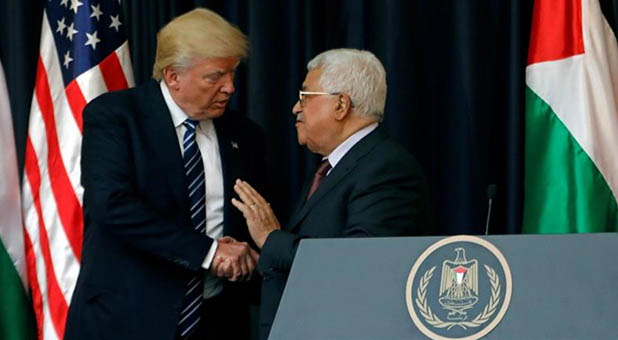It was heartening to hear that President Donald Trump privately confronted Palestinian Authority (PA) President Mahmoud Abbas on his incitement of terrorism and payments to terrorists. The question is whether the Trump administration will confine itself to rhetoric or follow up with concrete steps regarding the Palestinians and terrorism.
An unnamed “Palestinian official” has told various media outlets that during the recent Trump-Abbas meeting in Bethlehem, Trump said, “You lied to me in Washington when you talked about commitment to peace, but the Israelis showed me you were personally responsible for incitement.”
According to the report, Trump “made it clear to Abbas that he must curb anti-Israeli incitement in the Palestinian education system, saying Abbas cannot turn a blind eye to Palestinian incitement and pay stipends to terrorists’ families while simultaneously setting conditions that hinder any progress in the peace talks.”
Abbas’s reported response is very important, because it gives us a clue as to how he may try to wiggle out of the controversy. The unnamed Palestinian source said Abbas replied that “in the past, there was a joint Palestinian-Israeli committee that sought to deal with incitement on both sides, but it has not met for years.”
Here’s what Abbas was talking about. In 1998, Israel began complaining seriously to President Bill Clinton that the PA’s incitement to violence and hatred was a blatant violation of the Oslo Accords. So Clinton created a committee called “the “Trilateral U.S.-Israeli-Palestinian Anti-Incitement Committee.” Its purpose would be to decide the validity of complaints from either side.
That formula seemed to make sense. Obviously, each side has a very different view of what constitutes “incitement.” So there needed to be a neutral, reasonable-minded third party to judge them. Presumably, the U.S. could serve that role. But after meeting just a few times in 1999 and 2000, the committee stopped functioning. Fifteen years later, the public was given a glimpse of what went wrong.
In an op-ed for The Washington Post in December 2014, Prof. Shibley Telhami of the University of Maryland, who was one of the American members of the committee, pulled back the curtain. Telhami, as a Middle East scholar, superficially seemed to be impartial and therefore qualified to be one of the American delegates to the committee. But in fact, he was deeply biased.
Telhami explained in his op-ed that the committee reached an impasse because the Israeli and Palestinian representatives “could not agree how to define incitement.” The Israelis, he wrote, “would present, for instance, a statement by a Muslim religious figure against Israel, and Palestinians would respond by citing settlement construction or episodes of Palestinian humiliation.”
Telhami’s self-serving description did not actually tell the whole story. The Israeli delegates didn’t present just “a statement by a Muslim religious figure.” According to one of the Israeli representatives, Palestinian Media Watch Director Itamar Marcus, he and his colleagues presented multiple statements that were by paid PA officials (some of whom were Muslim religious figures), as well as statements that were broadcast by the official PA media.
Clearly, the Palestinian position was ridiculous and illogical. “Settlement construction” and “humiliation” do not qualify as incitement. The fact that the PA doesn’t want Jews building homes in Jerusalem or having Palestinians checked for weapons at security checkpoints doesn’t make those situations incitement.
But for Telhami and the other American delegates to the committee, who were operating on instructions from the Clinton White House and State Department, the real goal was not to stop incitement. Their goal was to keep the “peace process” going. Confronting the PA on incitement might cause a crisis in the “peace process.” So instead of siding with the truth, the U.S. representatives chose to be “evenhanded” and not take sides.
This is where the Trump administration needs to be very careful. Reviving the Trilateral Committee on Incitement is no solution unless the American delegates clearly do not have a pro-Palestinian bias.
And the committee needs to start its work with a clear definition of what constitutes “incitement.” American policymakers can find a precedent by checking the criteria used in the Nuremberg Trials, when Julius Streicher, publisher of the anti-Semitic newspaper Der Sturmer, was convicted of incitement to mass murder, or in the 2003 case of the Rwandan newspaper editor and two radio broadcasters who were convicted by the International Criminal Court of incitement to genocide because they used dehumanizing language and encouraged violence.
I thank Shibley Telhami for being (unintentionally) honest about his bias and about the reasons for the failure of the anti-incitement committee. Now that we know what went wrong and why, the Trump administration can fix it—if it is committed to actually stopping Palestinian incitement instead of just talking about it. {eoa}
Stephen M. Flatow, a vice president of the Religious Zionists of America, is an attorney in New Jersey. He is the father of Alisa Flatow, who was murdered in an Iranian-sponsored Palestinian terrorist attack in 1995.
This article was originally published at JNS.org. Used with permission.
See an error in this article?
To contact us or to submit an article





















